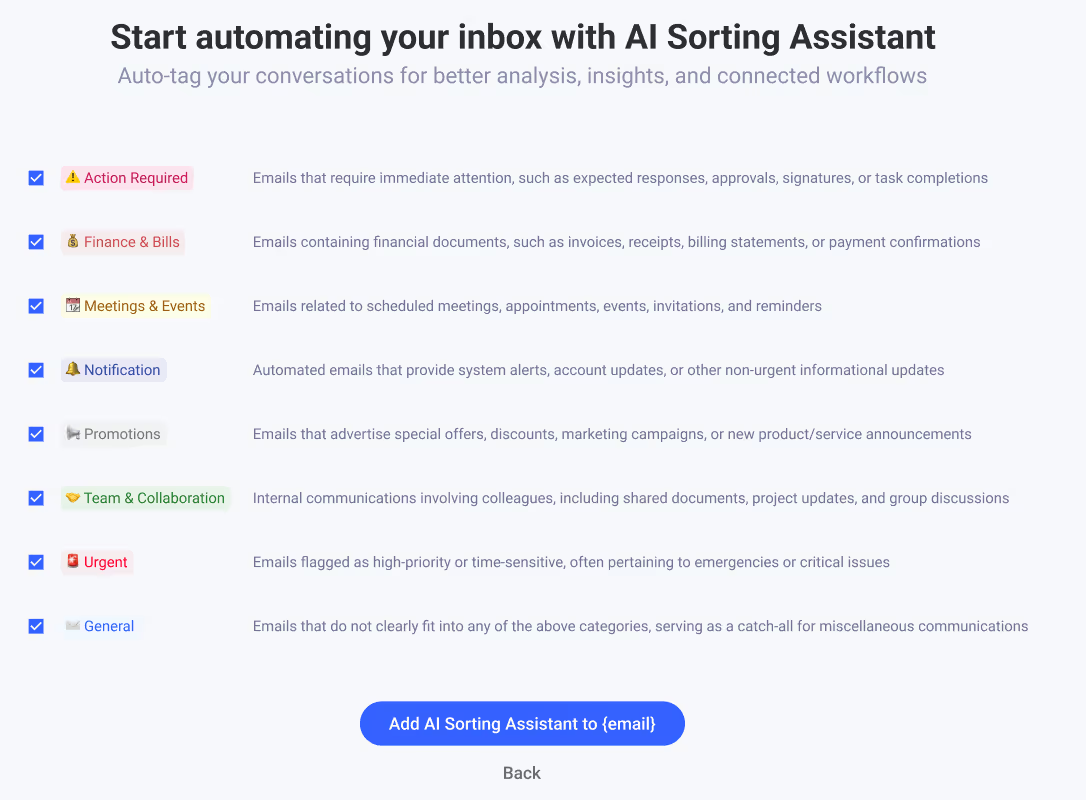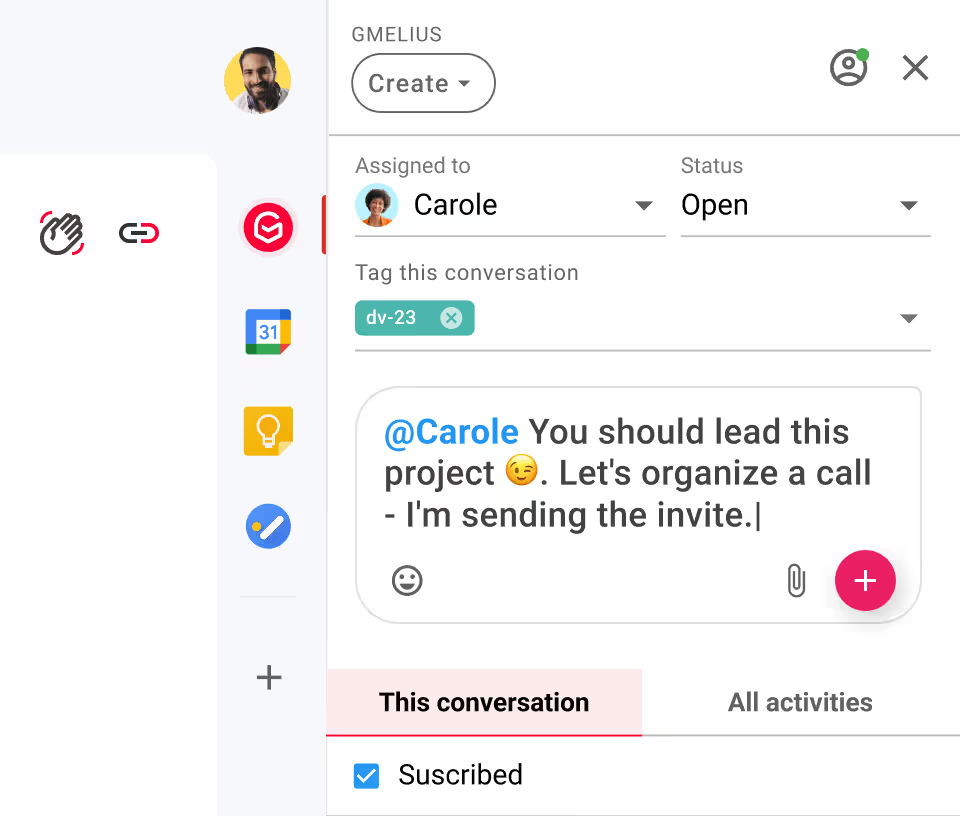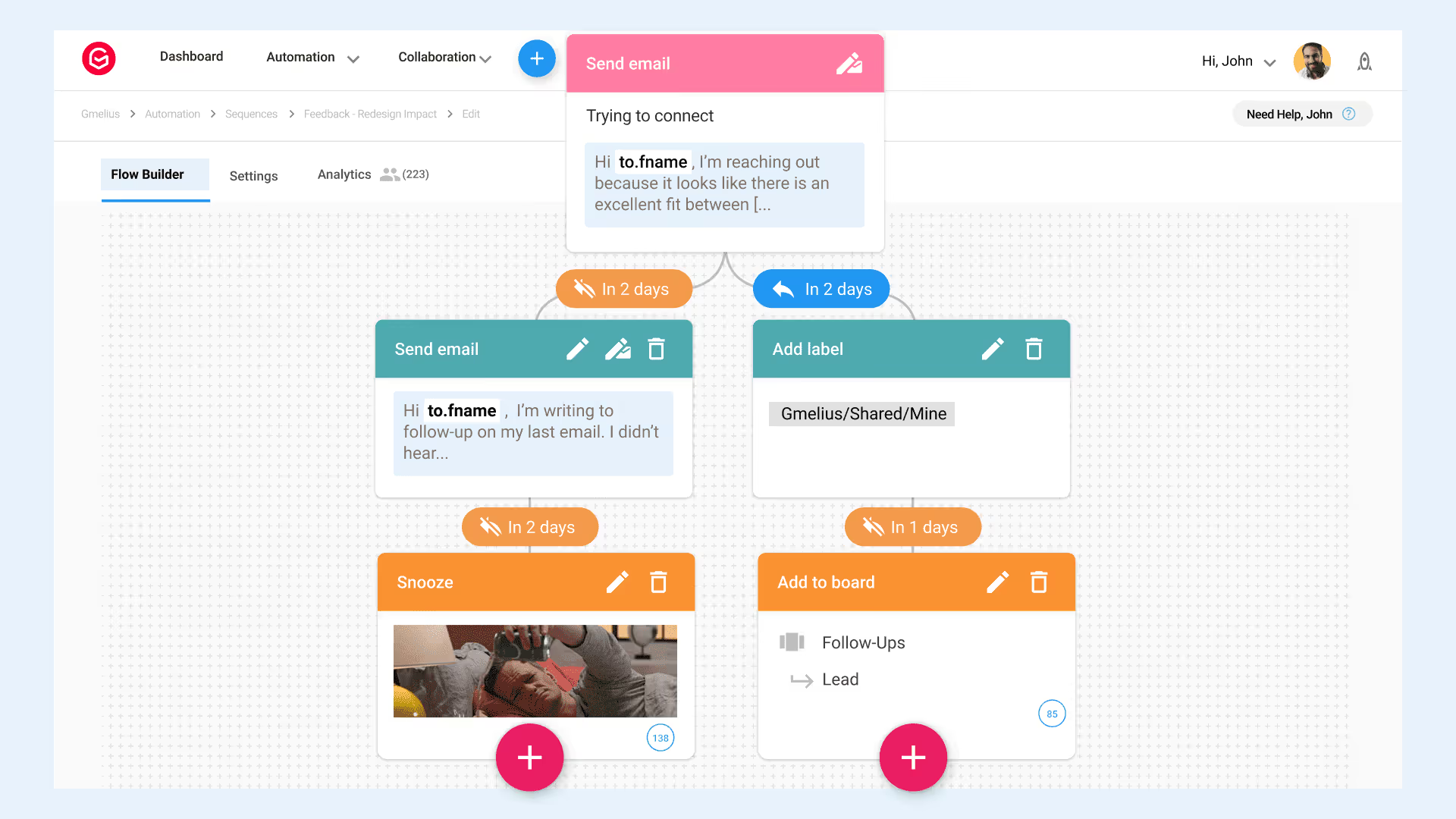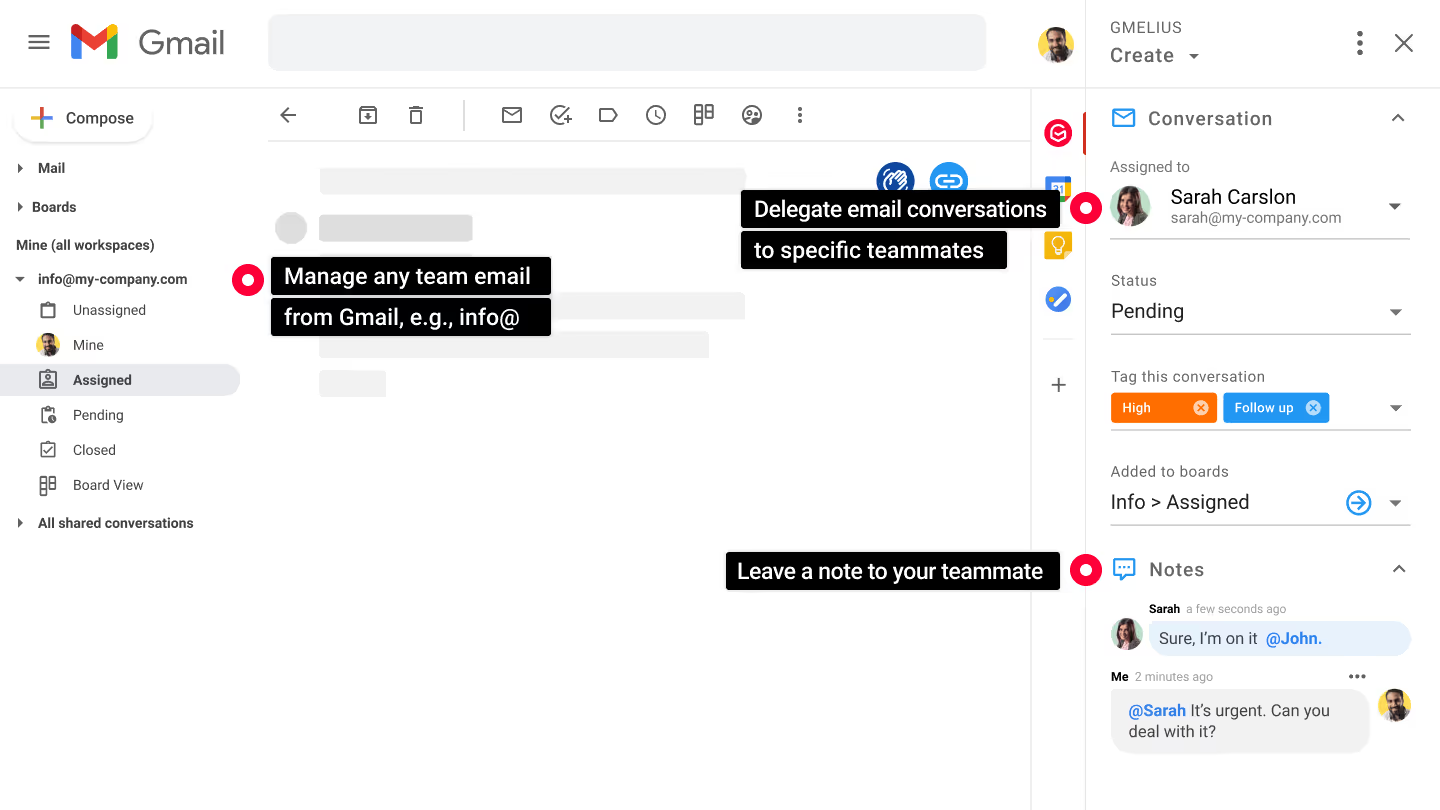Lawyers deal with a constant stream of emails: client inquiries, court filings, service notifications, and internal memos. According to one survey, lawyers can spend up to two-thirds of their workday on email, making the inbox the central hub of their legal work. In this article, we take a look at the reasons why Gmail can fall short and how to find a smarter email platform for legal teams.
Why Lawyers Spend So Much Time in Email
For modern law firms, relying solely on Gmail means running a case through an inbox. As caseloads rise and clients demand speed, that inbox becomes both a critical tool and a growing risk.
Client communication, filings, court notices, and internal collaboration
Much of a lawyer’s communication is asynchronous. Clients send documents and instructions by email, and attorneys respond with legal advice and drafts. Each email may contain multiple attachments and involve various stakeholders like paralegals and outside counsel.
Furthermore, critical notices for motions, orders, and deadlines are often communicated via email. Missing or misfiling one such notification can lead to sanctions.
Internally, multiple layers of review (from junior associates to senior partners) are everyday occurrences managed through email threads.
The average lawyer’s inbox as de facto case management tool
Without a dedicated case management system, the inbox becomes the fallback. Email threads are used for task tracking, and documents are attached and re-attached multiple times, leading to versioning confusion.
Searching for past correspondence relies on keywords and filters, often losing the context of which client or matter it belongs to. Reconstructing case facts from a high volume of emails is time-consuming.
This "non-legal work in email" (organizing, searching, and verifying) consumes valuable time and leads us to what Gmail can’t do well at scale in a legal context.
The Limitations of Gmail for Law Firms
While Gmail is robust and familiar, its limitations become apparent under the pressure of heavy legal use.
🚫 Lack of matter-centric organization for legal workflows
Gmail uses labels, but these are not "matters" with associated metadata like client, case type, or jurisdiction. There is no built-in way to enforce that every email is tied to a unique matter identifier, making it easy for different drafts of a document to exist across separate email threads.
🔒 Security and confidentiality concerns
While Gmail offers standard encryption, fine-grained controls like end-to-end encryption with client-controlled keys are not standard. Access control is often coarse, and managing permissions for different roles (partner vs. associate vs. paralegal) is difficult to enforce robustly.
⚖️ Compliance and retention challenges
Retention rules in Google Vault are typically set at the domain level. Lawyers often need per-client or per-matter retention windows, which Gmail doesn't natively support with automatic enforcement. Exporting email threads for discovery is a manual, error-prone process, and placing manual holds on emails to prevent deletion risks spoliation.
.🤝 Collaboration gaps for paralegals and support staff
Without shared inboxes designed for teamwork, collaboration happens via forwarding and BCCs, which creates duplication and context loss. Gmail doesn’t offer a way for a team to privately discuss an email thread within the thread itself.
🔄 Risk of mixing personal and professional accounts
Human error can lead to sending emails from the wrong account, potentially violating confidentiality. Personal accounts often have weaker security, and if used for client matters, they increase the risk of a breach and are outside the firm's control for data retention and recovery.
These structural shortcomings have real consequences for confidentiality, compliance, and client trust.
What Lawyers Actually Need From an Email Platform
To move beyond Gmail’s friction toward clean, secure, and scalable legal workflows, an email platform must offer features deeply aligned with legal practice.
1. Matter-based email organization and tagging (with metadata)
A legal email system should treat a "matter" as a primary object with a unique ID and associated metadata, such as client name, jurisdiction, case type, and key deadlines. All communications and documents should link directly to these matter objects.
The system should also support automated tagging rules that classify emails based on sender, keywords, or other triggers. For instance, an email from a court clerk containing "Motion to Dismiss" could be automatically tagged to the correct matter and phase.
This allows for hierarchical organization not just by matter but also by internal phase (e.g., intake, discovery, trial). The ability to track a matter's progress through these phases provides a clear, at-a-glance dashboard of all active cases, ensuring nothing falls through the cracks.
To support lawyers, Gmelius offers automated AI tagging that immediately labels incoming messages using contextual cues and custom training.

2. End-to-end encryption, secure access controls & detailed audit
Beyond standard encryption in transit and at rest, a legal platform should offer optional end-to-end encryption for highly sensitive communications where the firm or client holds the keys.
Access should be governed by granular, role-based permissions (RBAC), allowing firms to define precisely who can view, edit, or comment on specific types of information, from partners with full access to external counsel with limited visibility.
To support evidentiary requirements, every action (view, download, forward, delete) must be logged in a tamper-evident audit trail. These logs should capture the user, timestamp, IP address, and device, providing an unalterable record of all activity for compliance and security reviews.
3. Built-in retention, compliance and legal hold
Firms need the ability to configure and automatically enforce retention policies on a per-matter or per-client basis, aligning with differing statutes of limitations and jurisdictional rules.
The system must also allow for a "legal hold" to exempt specific matters from automatic deletion. It should provide tools to help meet regulatory requirements like GDPR or HIPAA, including data localization and secure disposal.
For eDiscovery, the platform must facilitate the export of email threads, attachments, and all associated metadata in standard, court-admissible formats. This ensures data integrity is preserved and streamlines the discovery process, reducing manual effort and risk.
4. Shared inboxes and internal collaboration tools
Effective team collaboration requires shared inboxes for aliases like intake@firm.com, where conversations can be assigned to specific team members to ensure clear ownership and accountability.
The platform should also enable multiple users to collaborate on email drafts, with changes tracked and an internal review process before sending.
Crucially, teams need a way to discuss a client email without forwarding it or switching to another app. Internal notes and @mentions layered on top of an email thread allow for private, in-context conversations, keeping all communication related to a matter in one place.

5. Seamless integration and workflow automation
An email platform must integrate with the broader legal tech stack, including case management systems (Clio, PracticePanther), document management systems (iManage), and billing tools. This creates a unified workflow where data syncs seamlessly between applications.
Even when an integration does not exist, a vendor like Gmelius will help you build a secure connection between industry platforms and your inbox.
Further, you need powerful automation to handle routine tasks. For example, an if-this-then-that rule could route a client email containing "billing inquiry" to the finance team or escalate a message that hasn't been answered within 24 hours.

AI assistants can further enhance productivity by suggesting draft replies or classifying incoming emails, such as Gmelius’ AI sorting assistant and AI draft assistant.
6. Scalability, usability and auditing features
As a firm grows, the system must scale effortlessly. This includes easy user provisioning with custom roles (partner, associate, external collaborator) and workflows for onboarding and offboarding staff.
The platform must maintain high performance even with thousands of emails and large attachments per matter, ensuring that search and load times remain fast.
Finally, secure mobile and offline access is essential for attorneys working on the go, since a lot of legal work is done outside of the office. The platform must provide core functionality on mobile devices with robust security, ensuring data is accessible without compromising confidentiality.
The Gmelius progressive web app (PWA) provides powerful collaboration on email with feature parity between web and mobile.
How Gmelius Provides Powerful Email Collaboration for Legal Teams
To fill the gap between what law firms need and what Gmail offers, Gmelius layers collaboration, automation, and compliance tools directly on top of Google Workspace.

- Shared inboxes and labels: Gmelius lets teams manage group mailboxes and share labels directly inside Gmail, so everyone sees the same categorization.
- AI assistants: It offers AI-powered assistants for drafting, sorting, and dispatching emails, along with rules to define automated workflows.
- Shared email drafts, email notes & @mentions: Teams can collaborate privately on emails with internal notes and mentions, eliminating the need for external forwards.
- Templates, permalinks, delegation: Gmelius provides standard reply templates, unique links to email conversations for easy reference, and seamless email delegation.
- Analytics & reporting: Dashboards track key metrics like response times, conversation volumes, and workload distribution.
- Kanban boards, custom views: Emails can be turned into tasks on a Kanban board, and custom views allow for filtering by matter, tag, or team member.
- Automation for SLA, escalation, rules: Firms can define and enforce Service Level Agreements (SLAs) with automated routing, assignments, and escalations.
Gmail Only vs. Gmelius: A Side-by-Side Comparison
To illustrate how Gmelius builds on Gmail to meet the demands of law firms, here’s a side-by-side breakdown:
These differences highlight why lawyers who stick with Gmail alone face growing operational risks, while those who pair it with Gmelius unlock efficiencies and safeguards that match the rigor of legal practice.
Upgrading Your Legal Team from Gmail
Recent research shows that 79% of lawyers now use AI daily for tasks like drafting and client engagement.
This indicates a broader shift: law firms are ready to augment traditional tools like Gmail with smarter capabilities. Gmelius is built to be that alternative. It retains Gmail’s familiarity while delivering matter-centered organization, automation, SLA enforcement, and robust collaboration and compliance tools.
But transitioning to a smarter email workflow requires a structured approach. The first step is to plan by auditing your current email practices to identify pain points, such as which matters suffer from slow response times.
Based on this audit, you can define a clear matter taxonomy with standardized tags for case types, jurisdictions, and phases (e.g., intake, discovery, trial). With this framework, you can assess and select the right enhancement tool, like Gmelius, ensuring it integrates with your existing case management and billing systems.
Once a tool is chosen, begin a pilot implementation with a single team or practice area. Train them thoroughly on new features like shared inboxes, matter tagging, and automation rules, focusing on both the "how" and the "why."
Have you tried Gmelius yet?



.avif)
.avif)

.avif)

.avif)